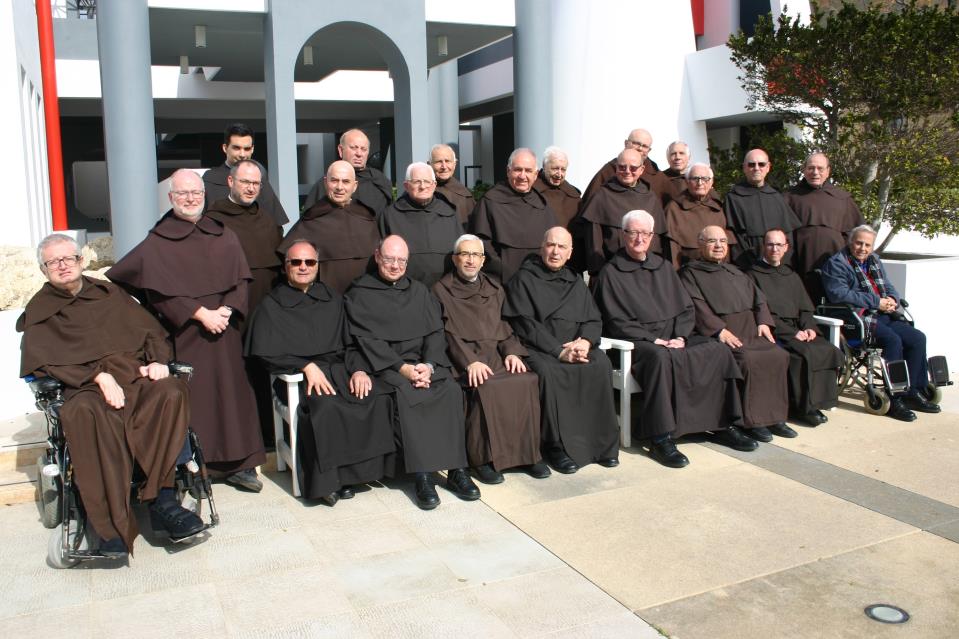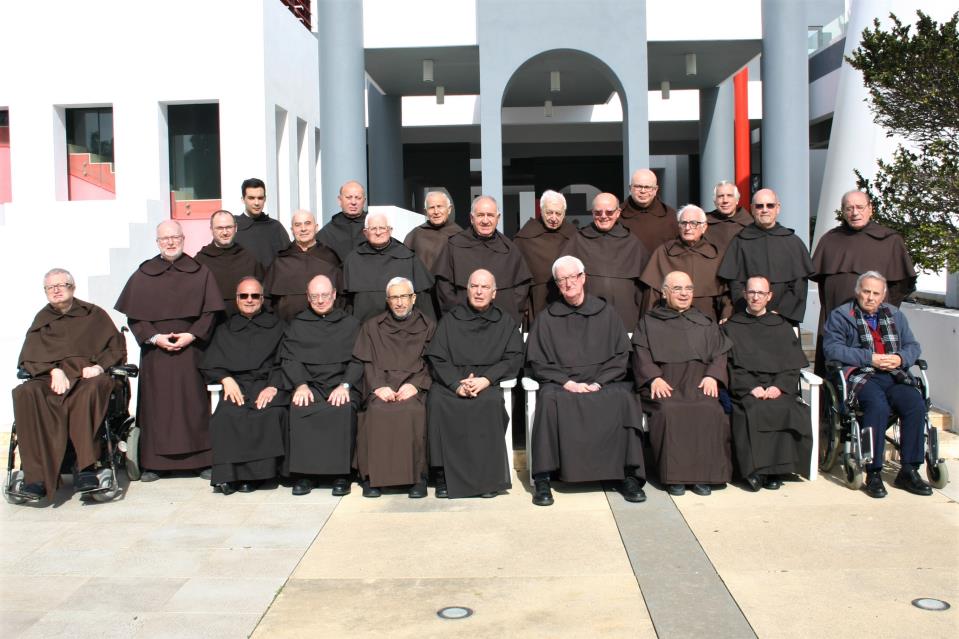Fr Charles Mallia, who was recently elected as the Provincial prior of the Maltese Carmelite Province, said that that allowing Catholic priests to marry could increase vocation numbers.
In line with recent comments made by Archbishop Charles Scicluna that the Catholic Church should revisit its celibacy rule for priests, Fr Mallia said a change to the fundamental rule of celibacy “might attract a few people (to the priesthood while still having) a family”, arguing that there exists an enticing scenario for some men who desire to embrace both priesthood and familial responsibilities.
He mentioned his meeting with protestant and Greek Orthodox priests who live this married priesthood lifestyle, telling The Malta Independent on Sunday in an interview that “it seems quite feasible” that a man could devote eight to 10 hours a day to the priesthood before going back to his family “like a regular person” would after a day’s work. He also added that he already lives a similar lifestyle, in that he returns to his community after each day of work.
Last month Archbishop Scicluna told Times of Malta that the Church should revisit its celibacy rule and consider giving Catholic priests the option to marry, even though, he acknowledged that, “it will sound heretical to some people”. This marked the first time that local authorities spoke publicly for a change to this centuries-old rule; up until Scicluna’s comments, the Curia had defended the Church’s reasoning that a priest should solely dedicate his life to the Church and his community.
This rule was formally introduced by the Catholic Church onto its clergy in the 12th century, though it can be changed by the Pope since it is not Church dogma. “It was optional for the first millennium of the Church’s existence and it should become optional again,” the Archbishop had said.
However, the Pope does not seem to be in favour of this change, judging by a recent example. In 2019, Pope Francis rejected that an exemption to this rule was to be granted to men in the Amazon region to better support the Church’s needs there, even though the Synod of Bishops, which acts as an advisory body to the Pope, had strongly voted in favour of this.
“I don’t think it is impossible,” Fr Mallia said on the potential lifestyle change.
Fr Mallia also mentioned that there is already a married Maltese priest who has his family with him on the Maltese islands. He said that this man was originally ordained as a priest in the English Church while he lived in England. He then converted to Catholicism and is now “doing fine” with his family here in Malta, resulting in this exceptional case.
The Carmelites’ Provincial prior addressed the opinions of local outcry that opposed the Archbishop’s comments and told this newsroom that he has been fortunate to have been abroad and been exposed to all sorts of different lifestyles, including that featuring marriage and priesthood. He thus stated that, after coming into contact with these people, he is of the opinion that “it’s no big deal” and that “things [still] work out”.
Moreover, he attributed some of the strong opposition that was met with this public statement to a lack of exposure to other lifestyles. “If you’ve been used to, all your life, seeing only one form, then I think it becomes quite a challenge to see the possibility of others. I think some people have difficulty with change – more than others,” he said.

What is causing the present absence in vocations?
Last week, the Carmelites announced that they will no longer lead the parishes of Balluta and Mdina, but will retain those of Fgura, Valletta and Santa Venera. The decision was taken because of a shortage of Carmelite priests, given the drastic drop in vocations.
These parishes shall be handed over to the Archdiocese. A contract-like agreement shall be written up to make this handover official, and eventually, the Archbishop will nominate a parish priest. It is possible that this vacation process should be completed by September, though nothing is fixed as of yet.
They also gave up another House located in Fleur-de-Lys, Birkirkara just last year to the Archdiocese. Since this building was transferred for the parish’s use, it cannot be sold for commercial purposes, Fr Mallia said.
Twenty-four people participated in this long voting process, including the Order’s Superior General, who came from Rome to help in these proceedings and in the timely election of their government.
When questioned about the lack of vocations in modern society, Fr Mallia listed several reasons. From a statistical standpoint, he referenced Malta’s low birth rate, labelling it as a “very significant problem”. He also said that due to the country’s low birth rate of just 1.13 births per woman (which is an EU-low), “we don’t even have enough workers”. Fr Mallia also remarked that “it was surprisingly common for siblings in the past to take up vocations”, and that with smaller families, this phenomenon is being observed less frequently.
The former rector of St Elias College said that another factor is that there exists many more opportunities in employment nowadays, including in social work. “Social workers nowadays can remain lay people and remain in a social area,” he said.
Fr Mallia then noted that nowadays, youths tend to choose their career paths “much later” than they used to in the past. He said he knows “quite a number of young people” who were interested in taking up a clerical path during their teenage years but opted against this as they got older.
Fr Mallia stated that with several laity members taking up studies in theology, he believes that this interest “has not necessarily died down” across society.
While humbly saying that tackling this issue does not fall under his expertise as he has focused on schools, he said that personal contact, for example, getting to know the Order for a day or weekend, holds great potential in possibly boosting vocation numbers – though embracing this lifestyle comes with some “natural challenges”, he said. For those still in their adolescence specifically, he mentioned the challenges of “lack of liberty, chastity and prayer”. For the latter, he acknowledged that many lay people have succeeded in embracing this into their daily routines.

Diminishing numbers
There are just 15 Maltese Carmelites residing in the Carmelites’ convents; divided across six locations. This meant that prior to this decision, there was an average of only two or three Carmelites in each place.
“It’s an unsustainable situation,” he stated. “The numbers have decreased significantly. We need to reorganise.”
The Carmelites have long histories in both Mdina and Balluta. Fr Mallia said that the Order’s presence in Balluta goes back over 140 years, meanwhile, their presence and service in Mdina saw them witness the Maltese revolution against French rule and even the 7.4 magnitude earthquake that hit the Maltese islands in 1693. The Order has been on the Maltese islands since the 15th century.
“We had to give up somewhere,” Fr Mallia said. “At a point, we were afraid we weren’t going to conclude.”
Fr Mallia joined the Order half a century ago and at the time, there were between 70-80 Carmelites, he said. During this period, they were expanding. They had Houses in Bolivia and Sicily, as well as people studying in Rome – a practice that is still done today. The Carmelites have been shrinking in numbers as part of the vocation crisis that has been ongoing in the Western world for the past few decades.
Explaining the Order’s global growth levels, he noted its decline in the West but highlighted positive growth in Africa and Indonesia. “A hundred years ago, we probably had the same number,” he said. These growth levels were attributed to three potential factors: population numbers, larger family sizes and higher birth rates, and for the African continent, he said that the Church has been growing there too.
Hence, he stated that “it is possible” that the Order might disappear from Malta, though “the future is a mystery”, he remarked.
Within the Maltese Province of the Carmelite Order today, there are a total of 28 living Carmelites – some of whom opted to remain as brothers. With an average age of 66 years old, the oldest member is 91 years old while the youngest is 32 years old; the next youngest member is 45 years old and the majority of them are over 65. The Order’s last intake was in September 2009, nearly 15 years ago, and it consisted of just their youngest member still present today – he became a fully-ordained Carmelite priest in 2018. There was a sizeable gap between this 2009 intake and the last one before it, Fr Mallia told this newsroom.
To become a priest, the process is a minimum of five to seven years, depending on the course one follows, Fr Mallia said. This includes a bachelor’s degree in philosophy, another bachelor’s degree in theology and a single year as a novitiate where one learns about Carmelite life and history on a full-time basis. He also remarked that nowadays, some people also opt for a master’s degree in theology. This whole process typically begins after contact is made and one begins spending more time at the convent before subsequently living there.
Contrasting this long process, and the rare intakes, the old age of the Carmelite Order’s friars is resulting in approximately one death every year, according to Fr Mallia. The impact was significant for the Balluta parish as four priests, who were stationed there, all passed away in the last six months, he said. Hence, the recent news, announcing that the Carmelites were leaving the town, was not a total shock to its parishioners, though “there is a bit of disappointment and hurt”, Fr Mallia acknowledged. This conceded place was also used for the preparation of younger Carmelites.
“We are very grateful to them – they have supported us in many ways,” he said about the community in Balluta.
The Carmelites have a close community in Mdina and wish to keep providing them with their service through an organisation; they hope to keep supporting them, even after they leave the locality.
The vocation crisis being experienced is “nothing new” and is actually hitting the Maltese islands later than other European countries.
“We felt it late because we had a good number and Maltese continue to work even at old age, in their 80s,” he said. “Only now it’s hurting because they cannot continue the service as they had been doing.”
Fr Mallia noted the possibility that the Carmelites may one day be forced to relinquish their presence at St Elias College in similar fashion. The Order hopes that this hand is never forced onto them since they see it as an opportunity to retain contact with young people.
He then narrated a brief story that he was once told by the Prior General of Dominicans, who met a sister who was one of the last few from her congregation. Fr Mallia recounted that the sister had asked the Dominican Prior General if God will let her congregation die. To this, he responded that “He let his Son die”.